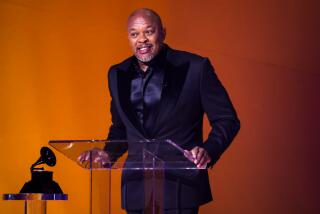Schroeder Dies at 54 After 620 Days on Jarvik Heart
- Share via
William J. Schroeder, the “tough old nut” with a strong chin and a strong will, but a heart so weak that he had only hours to live when he received the world’s second artificial heart, died Wednesday.
The 54-year-old Indiana father of six had survived one year, eight months and 12 days--longer than any person thus far--on the plastic-and-metal Jarvik-7 heart, and was the last survivor among five patients who had received the pump as a permanent substitute for a human heart.
Doctors at Louisville’s Humana Hospital Audubon said Schroeder died after a series of strokes that impaired his ability to breathe.
Schroeder became lethargic and was having difficulty breathing Tuesday morning and required resuscitation, said Dr. William C. DeVries, the chief implant surgeon. Schroeder’s wife, Margaret, and the Schroeder children were called to his bedside after his condition worsened. He died at 1:35 p.m., said Donna Hazle, a hospital spokeswoman.
Schroeder’s family issued a brief statement Wednesday night saying: “We have been through many rough times in the past 21 months, but the past two days have been the hardest. We are all saddened by the loss of our father, a truly great person.
“Six-hundred (and) twenty days ago we came to Humana and to Dr. DeVries to take a desperate chance to give new life to a father we loved so very much. We leave today taking the sweet memories of this brave and pioneering man.”
The length of Schroeder’s survival and his ability to live outside the Kentucky hospital were signs of progress in the experimental implant program. But three earlier strokes, all apparently related to the man-made pump, left his speech and mobility severely impaired and raised questions about the risks of the device and the quality of life recipients might expect.
“He volunteered for the artificial heart because he loved life and the people around him, and he wanted to help others,” said DeVries.
“Bill set many milestones during his 620 days with the heart. But the main one, the one we’ll remember, is the way his indomitable spirit lit the path for those who will come after.”
Dr. Phil Dawkins, one of Schroeder’s doctors, said his patient’s legacy would be that “a major amount of knowledge has come from his experience” on the artificial heart.
Schroeder’s new life began with promise and remarkable progress, only to be set back by a debilitating stroke. After four rocky months, Schroeder was released from the hospital and moved into a specially equipped apartment across the street.
Although still suffering speech problems caused by his stroke, Schroeder seemed to be on the mend. He traveled frequently around Louisville in a van and even went fishing on a sunny Saturday in April. But on May 6, 1985, he suffered a second stroke, which left parts of his body temporarily paralyzed, and he was readmitted to the hospital.
He returned to the apartment Aug. 11 and within weeks was eating and shaving without assistance. As the one-year anniversary of his implant approached, his doctors began making plans to allow Schroeder to move permanently back home to Jasper, Ind.
But there was another setback. On the weekend of Nov. 9, he suffered a third severe stroke, and was again hospitalized. His neurologist, Dr. Gary Fox, marveled at the strength of Schroeder’s will to live. Asked how much more Schroeder could take, Fox responded: “I don’t know. He has amazed me.”
First Request Was a Beer
From his first request after his initial surgery--for a beer--Schroeder’s wit and down-to-earth manner delighted his doctors and the millions of people around the world who followed his progress, sent cards and gifts and wished him a speedy recovery.
Schroeder and his family handled the worldwide attention without pretension. He cried tears of gratitude when discussing what his doctors had done for him and telling how happy he was to be alive.
Within days after his surgery, he was touring the hospital in his wheelchair, his Jarvik pump frequently powered by a portable driver designed to give artificial heart patients near-normal mobility when they go home from the hospital.
Whether he was showing off his surgical scar, inviting a visitor to put a hand on his chest and “feel my heart,” or reassuring a fellow Jasper native awaiting heart surgery, Schroeder was by all accounts a delightful presence around the hospital.
Bent Reagan’s Ear
When President Reagan called to wish him well, Schroeder bent the chief executive’s ear about the runaround he was getting from the folks at Social Security.
Those first two weeks with the heart were good times for the retired federal employee. Schroeder himself said he felt “fantastic.”
But on the evening of the 19th day, Dec. 13, only a few hours after receiving a hand-delivered Social Security check spurred by his complaint to Reagan, he suffered the stroke.
He was unconscious for about an hour and he awoke paralyzed on his right side and unable to speak. DeVries said later he feared he might have lost his patient.
Speech Was Slurred
Although Schroeder awoke, he had difficulty recognizing his family and remembering what day it was, and his speech was slurred. Neurological tests indicated that Schroeder had actually suffered small strokes, severely damaging three areas of his brain.
DeVries said he thought the strokes resulted from a blood clot that formed in or near the heart and broke into pieces en route to the brain. Dr. Robert K. Jarvik, inventor of the artificial heart, agreed.
But both men said they would probably never be sure whether the Jarvik-7 heart was to blame for the strokes. Future implants might shed some light on the link between the heart and strokes, they said.
While the strokes set back Schroeder’s progress, and apparently caused a temporary sag in his spirits, his doctors remained optimistic that he would be able to leave the hospital, something the first mechanical pump recipient, Barney Clark, never did.
Even before Schroeder was discharged from the hospital, DeVries resumed his research project, implanting an artificial heart in Murray P. Haydon, a retired auto worker from Louisville, on Feb. 17, 1985.
Haydon Died in June
Haydon died on June 19 of this year. Clark died 112 days after receiving the device in Utah on Dec. 2, 1982.
DeVries’ fourth patient, Jack C. Burcham, 63, a retired railroad engineer from Le Roy, Ill., died on April 24, 1985, 10 days after receiving his artificial heart. His death was caused by pressure from clotted blood that collected over the remnants of his natural heart and shut off the blood flow, an autopsy indicated.
DeVries has not performed the procedure since then, although he has federal approval for three more permanent mechanical heart implants. The procedure was performed in Sweden, however, on Leif Stenberg, who became the fifth person to receive a permanent artificial heart. He had the operation on April 7, 1985, and died seven months later.
Although DeVries remains committed to using the man-made heart as a permanent device, doctors in Arizona, Pennsylvania and Minnesota have used mechanical heart pumps as temporary measures to keep failing patients alive until human donor hearts could be found for transplantation.
‘Pure Mid-America’
Schroeder, a strapping six-footer, was a religious, strong-willed man and “pure mid-America, small town Mid-America,” said Dr. Allan M. Lansing, the chief medical spokesman for the implant team at Humana. “His roots are in everything that is strong and basic about the United States of America.”
His positive attitude was as important as his physical condition in choosing him for the experimental procedure, the doctors said.
Schroeder’s heart condition wasn’t diagnosed until he had a heart attack at age 50. He had a double coronary bypass operation a year later, in 1983, but the progressive weakening of his heart muscle continued.
He was rejected as a heart transplant candidate, because he was over 50, generally considered the age limit for transplants, and because he was a diabetic.
Experimental Alternative
In November, DeVries and other doctors at Humana told Schroeder in detail about the experimental alternative.
They did not try to talk Schroeder into it. “It could leave you a vegetable,” DeVries told him. DeVries and Schroeder discussed the 17-page consent form, which contained a detailed recitation of what went wrong in Clark’s case and what could go wrong in a second heart implant.
“We just kind of sat down and asked, ‘Dad, what do you want to do?’ ” said his wife, Margaret. “He said, ‘I have no other thought. I want to go all the way.”
However, a year after the implant, Mrs. Schroeder told The Times that she wished she and her husband had discussed--before the implant--”how far down the line he wanted us to go.”
“To me, a year in a wheelchair is a lot better than six feet under the ground,” she said. “But, for Bill, I don’t know whether he’s gone through hell or not.”
‘Is It Too Bad?
Toward the end of the first year, Margaret Schroeder said, she had begun trying to ask him, even though the effects of the strokes had made communication difficult.
“I say, ‘Honey, have you had enough? Is it too bad?’ He never indicates that it’s too much or that he doesn’t want to go on,” she said. “I think if he didn’t want to go ahead he would let me know by blinking his eyes or squeezing my hand.”
Nevertheless, his children, who frequently drove the 90 miles from Jasper to Louisville to see him, said they did not regret their father’s decision to receive the Jarvik-7 heart. They listed a wedding, picnics, fishing outings and birthday parties as examples of events Schroeder was able to attend only because his life had been prolonged.
Schroeder was born in Jasper and he raised his family in the same house his parents had owned. He graduated from Jasper High School in 1950 and served in the Air Force for 15 years, most of that time as a military air traffic controller. With the Air Force, he spent time in Texas, Michigan, North Carolina, Newfoundland and Saudi Arabia.
Retired From Air Force
After retiring from the Air Force, he was a production worker, then an ammunition inspector and most recently a quality control specialist in pyrotechnics with the Crane Army Ammunition Activity in Crane, Ind.
Dick Garvey, director of administration for the Crane Center, said Schroeder was “kind of a tough old nut who would be good for something like this.” Schroeder’s nickname at work had been “The Bull,” because he tended to be bull-headed about things and unwilling to let anything get him down.
He was also a member of the American Federation of Government Employees Union, and was president of the chapter representing workers in Indiana, Kentucky and Ohio. He joined the Knights of Columbus and helped found a chapter in Michigan when he lived there.
He retired in 1984 after two years of heart trouble. At the time of that heart attack, Schroeder was about 50 pounds overweight and was smoking one pack of cigarettes a day. He had smoked for 30 years but quit after the heart attack.
History of Heart Disease
Schroeder’s family had a history of heart disease. His mother died at age 57 of a heart attack. His father also had heart disease but died of lung cancer at 63.
The night before his surgery, Schroeder was so weak that his doctors feared he might not survive until the morning.
A few days after the implant, Mrs. Schroeder said that no matter what happened in the future she thought her husband’s life had already been longer and richer than it would have been without the artificial heart.
Schroeder will be buried in Jasper on Saturday.
Scott Kraft, now based in Kenya for The Times, covered the Humana Hospital artificial heart program while a Midwestern correspondent for this newspaper.







